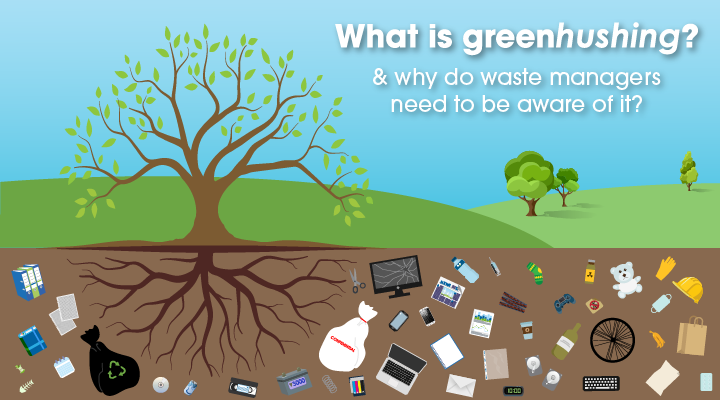
What is greenhushing?
You’ve probably heard of greenwashing. Greenwashing is where companies convey a false sense of environmental friendliness by exaggerating sustainability efforts or commitments. For example, a well-known global bank faced public backlash for marketing its pledge to be net-zero by 2030, all the while approving £9.7 billion in funding to fossil fuel developers. But what is greenhushing?
What is greenhushing?
Greenhushing is where companies purposefully avoid mentioning their sustainability efforts and climate targets altogether or don’t provide sufficient evidence of their efforts. There is only one reason why a company would avoid being transparent about sustainability. They don’t want you to know about it.
South Pole’s 2023-2024 Destination Zero Report reveals that nearly a third of companies with net-zero targets polled said that the delivery of their net-zero strategy was more difficult than expected. This could be a reason why many companies are greenhushing. They haven’t been able to achieve what they set out to achieve, or they do not have the knowledge to succeed. Other companies may simply not have a net-zero strategy at all.
The same report also revealed that 51% of environmental service companies said the fear of scrutiny was the reason behind not communicating their climate targets. When it comes to environmental commitments, every action matters. No organisation will ever be perfect, and as we all race to zero, many carbon-reduction technologies and innovations are still in the development stages. Despite this, being open to criticism is a storm that some companies may not want to weather.
Why do waste managers need to be aware of greenhushing?
If you are a Waste Manager or Facilities Manager, greenhushing is something you need to be aware of if you care about your company’s environmental impacts. Not doing your due diligence could mean you are unknowingly sending all your old business materials to landfill.
Greenhushing can be hard to spot because it can be masked behind the trickle-truths of greenwashing.
Take textile recycling as an example. Some waste management suppliers will tell you that they’ll recycle all your old textiles into new garments or other useful items like building insulation. Question this. Do your research into textile recycling in the UK. Textile recycling is not always straightforward if you are mixing fibres and colours. Would a clothing manufacturer want to spend dozens of man-hours separating and testing fibres to create new garments? Probably not. The resulting garments would have to be sold with a very high price tag to profit from the time spent on manual separation. Would construction companies risk insulating new houses with an unknown mix of potentially contaminated or highly flammable fabrics? Probably not. Don’t be afraid to ask for specifics when it comes to responsibly shredding, recycling, or disposing of your waste.
The warning signs of greenhushing
If companies say nothing at all about their environmental commitments or do not have these commitments independently verified, greenhushing can be even harder to unpick. Questioning information that doesn’t exist is much harder to do than questioning marketed climate claims. Here are some warning signs to look out for when it comes to greenhushing:
All information about a company’s processes or climate action is vague.
Blanket claims like “we’ll recycle all of your waste” without any explanation of how that’s done is a concern. If you’re trusting someone with your commercial waste, you need to know what they are doing with it. Is the supply chain made up of reputable businesses? Is there anything you need to do at the source to separate certain materials? Will it be recycled in the UK or overseas? What will it be recycled into and how does this process work? These are all questions you should ask. It’s your commercial responsibility to make sure your waste is handled legally, so you should have proof that any outsourced waste solutions are conducted by fully compliant companies.

The company’s website lacks certifications, independently assessed accreditations, policies, and reports.
Another sign of greenhushing is a total absence of information about environmental accreditations, independent certifications, policies, or reports. Most companies aren’t obligated to share information about their sustainability at present. Obligations of this nature typically fall on just large companies.
However, the UK government aims to make endorsement decisions on Sustainability Disclosure Standards by July 2024. The standards aim to reduce greenwashing, unify UK sustainability reporting, and create restrictions on the use of sustainability-related terms in product naming and marketing. This is very good news. It will create cohesion in marketed climate claims and give buyers a clearer understanding of what sustainable buzzwords mean. While the standards will only apply to FCA-regulated firms and firms managing and distributing investment products, this standardisation of terms could set a benchmark for other industries.
If your waste management provider doesn’t currently publish their sustainability-related certifications, policies, accreditations, or reports, it could mean they don’t have any. Or, it could mean that their certifications aren’t verified independently. Either way, this is a cause for concern. The absence of these documents could mean a company is throwing caution to the wind in terms of the sustainability of its operations. It also shows a lack of preparedness. Businesses should be forecasting any potential future reporting obligations. They should also want to be transparent with their customers – even if there are still improvements to make.
You are constantly redirected to other departments or never receive direct answers to questions you ask about sustainability.
Not every person in every department will have the knowledge or expertise to understand the intricacies of sustainability and carbon outputs. In most organisations, this is the responsibility of a specific team or person. It might not be uncommon that someone in the Customer Service Team, for example, may need to check with their company’s sustainability specialist before giving you answers to carbon-specific questions.
However, if you are continuously transferred between departments, your questions are never directly answered or if you sense the person you are talking to is being surreptitious, you might need to dig a little deeper. If you know other customers of this organisation, ask their opinions. Try to escalate your enquiries to senior managers. Be persistent. Read reviews. Companies won’t always get everything right, and global sustainability doesn’t happen overnight. However, you are entitled to ask what happens with your commercial waste and the sustainability of your suppliers.
Transparency at Shred Station
At Shred Station, we have achieved CarbonNeutral® certification every year since January 2019. We publish our independently assessed annual greenhouse gas report on our website for full transparency into our environmental impacts. We also publish regular content about how we are reducing emissions. For emissions we can’t yet reduce, we will continue to offset to net zero through stringently verified projects. We will happily answer any questions our customers have about our processes and believe that all waste management companies should do the same.
Sign up for our newsletter to receive alerts about new blog articles, data protection advice, and Shred Station news.
